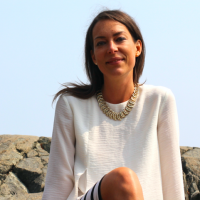(Not) Buddha says that each day, we are born again—so what if instead of making New Year celebrations a once-a-year event, we actually lived like it was New Year’s day, every day?
What exactly is New Year’s, anyway?
Is it just one day we collectively agreed upon to be the turning of a new leaf or lease on life?
For many, it represents a time for us to begin again and let go of the struggle, strife, or challenges of the previous year. It’s something that symbolizes a “fresh start.”
It also holds an interesting psychological idea we in the West like to cling to—the idea of hope.
For many, the New Year’s celebration is a way in which we hold out hope that next year will be better than the last.
In Buddhism, though, we believe this “fresh start” is something that can happen in every moment. We also believe it is an important practice to give up hope. Hope, in a Buddhist’s eyes, is something that keeps us from living in the present, and the present is the only place Buddhists believe we can become free from suffering.
There is much pressure around New Year’s eve (like most holidays) to have it be perfect, or something special. We often feel it must be celebrated with the right people, at the right party, with that really great outfit, and with everyone in just the right mood.
When we place such high expectations on one night, though, we often become disappointed (I know New Year’s eve has been this way for me on several occasions).
What would happen then, if this year we changed our perspective and approach? What if we set a new precedent and decided that instead of it being our one chance all year to begin again, we saw it as a reminder that we could begin again in a new way, any time we choose?
Many of the Buddha’s teachings are about awakening from the painful experiences of life we get stuck in, and choosing instead to see things in a more honest and intentional way. Mindfulness is a word we often use in this tradition, and it means we become keenly aware of what is occurring in the moment.
From a mindfulness perspective, we observe “fresh starts” regularly.
Here’s how we can use this New Year’s to begin a practice of mindfulness. With a little attention, we might get closer to living peacefully, like a Buddha, and release the pressure we put on ourselves and those special occasions.
Below are three Buddhist-inspired steps we can do this New Year to lighten up.
Let go of hope.
When I first heard this practice, it was taught by the Buddhist Nun Pema Chödrön, and it felt like a radical shift—not to mention a counter intuitive one.
Let me explain what this means. It may feel like if we gave up hope we would then live in despair, but how it is described by Pema is that when we are hopeful that something better will come along (like a new year), we continually miss what good might be happening in this moment.
In this way, hope actually discounts our current lives and selves. So instead of hoping for a better year to come, let’s instead look at what might be here now that is inspiring. As we do this, next year does not have to be better or worse than this one, and we attend to our lives with a gentler approach.
Let go of expectations.
Expectations are something I adore, but the crux of them is they are often the cause of our greatest suffering. Just like with our experience of wanting a certain night (like New Year’s Eve) to be just right, and then feeling incredibly let down when it is not.
Our expectations build up a false idea of how things “should” be. What if this new year, instead of expecting anything particular from the night, we just let it roll out as it does? We can try this practice in other moments of our lives as well.
The teaching of the Buddha is that we allow things to be as they are. That is why we practice meditation—we stop trying to manipulate our lives in a way that we think might make us be more comfortable. This practice of letting go of expectations can liberate us to a greater sense of balance, daily.
Celebrate a fresh start each day.
If there were one action that could cause a shift for the betterment of our world and ourselves, I believe the above statement would be it.
When we are struggling or stuck, we get caught up in the idea that change or transformation lies somewhere ahead. However, one of the most useful tools that Buddhism has given me is that in this moment, right here, we can begin again. We don’t have to wait until the end of the year to change how we feel or the way we move in our world. We can lighten up immediately, in this moment, and have a great day (or eve).
I don’t believe there is a “best way” to do anything, but I do feel in the teachings of the Buddha there lay a few jewels of wisdom that could help us live every day as a special celebration.
Instead of making New Year be about one night, or a better next year, why not embrace it like a Buddha and treat it as we could every occurrence in our lives—a means to awaken with greater peace presently?
Author: Sarah Norrad
Editor: Emily Bartran
Image: @elephantjournal
Copy Editor: Catherine Monkman
Social Editor: Catherine Monkman





Read 2 comments and reply